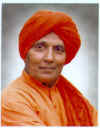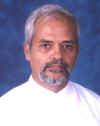|
Page 3
of 4
Peace in South Asia - is it
attainable?
the-south-asian
asks Swami Agnivesh
&
Rev. Valson Thampu
(cntd.)


Swami Agnivesh & Rev. Valson Thampu
"Fundamentalism signals the decay of
the spiritual core of a religion and society."
Which of the two is stronger -secularism or
fundamentalism?
Both are as strong as we make it to be. The appeal of every ideology depends
on the climate of opinion, especially the respect for truth and justice, we
create. From a partisan perspective, a terrorist appears a hero. To the
communally biased Godse, a Mahatma like Gandhi seemed a disaster. To the
fundamentalists there can only be pseudo-secularists; for them secularism is
not a genuine or authentic ideology. All secularists are, hence,
pseudo-secularists necessarily. From a secular perspective, on the other
hand, the fundamentalist outlook is prehistoric. Hence the importance of
what sociologists call the "plausibility structure"-the framework
of shared ideas, values and proprieties that acts as the shaping influence
on popular tastes and choices. The task at hand is not to decide if
fundamentalism is stronger than secularism or vice versa; it is, on the
other hand, to create the authentic plausibility structure for secularism,
or to propagate the authentic secular culture and outlook. This mandate is
subsumed in the Indian Constitution. To give ourselves a secular democracy
and to remain indifferent to the fundamental duty of propagating secular
values and norms is to be irresponsible and hypocritical. And today we are
paying the price for this hypocrisy.
Religious fundamentalism is a contradiction in terms; for it involves in
practice a violation of the 'fundamentals'(like love, compassion, truth,
justice, tolerance etc.) of the religion concerned. Fundamentalism signals
the decay of the spiritual core of a religion and society. It is when a
society becomes unspiritual that it gets hooked on the opium of
fundamentalism. This means, among other things, that for secularism to
remain robust, it must be nourished by a shared, trans-religious
spirituality. Today religions have become contradictions of spirituality. In
such a contest, fundamentalism might seem to be stronger. But that is a
pointer to the spiritual and moral degeneration of a society, rather than a
proof of the intrinsic strength of fundamentalism as such. Strength, at any
rate, is not the yardstick for measuring the merit of religion or
secularism. A madman may be stronger than his sane counterpart, but not
necessarily more desirable for that reason.
Can fundamentalism pose a serious threat to
the secular traditions of the
Indian sub-continent?
The danger that religious fundamentalism, especially of the majoritarian
variety, holds out secularism and democracy in the South Asian context is
eloquently illustrated by the woeful developments in the state of Gujarat.
The land of the Mahatma has been over-run by the combined armies of
religious and political (right wing) fundamentalisms. Once a people are
infected with fundamentalist prejudices and robbed of their freedom to think
and choose dispassionately, democracy begins to stagger on its feet and
collapse into fascism. The factors that aid and abet this process are: the
educational under-development of the people, the hijacking of religion by
vested interests and the exploitation of people's sacred sentiments for
political and other ulterior gains, the partisan patronage of the State, the
large-scale use of propaganda, the apathy of the intelligentsia, and the
support of the media. It does not have to be argued that religious
fundamentalism is already a plague for South Asia. But what needs to be
noted is the fact that secularism, as we know it today, has proved itself
unable to halt the juggernaut of religious fundamentalism in our context.
The antidote to religious fundamentalism is not religiously neutral
secularism, but true spirituality that insists on universal and inviolable
values and nurtures people in the practice of justice, compassion and
fair-play.
next
page
Disclaimer |

